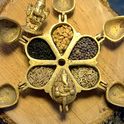Is it ok to publish a recipe from a cookbook on a personal blog?
What are your thoughts?
18 Comments
KaleHogJune 16, 2011
This has been a really wonderful discussion with lots of insight and perspective. Thank you to everyone who answered!
lorigoldsbyJune 16, 2011
There is the age old adage..."Do unto others...". How would you feel if someone used your winning recipe and posted it as their own work? Can you imagine the time and effort in producing a whole cookbook? What would you want others to do to recognize your work? I am very uncomfortable with the idea of just "adapting" without giving the original inspiration.
SarasitaJune 15, 2011
Great question. Really compelling discussion - especially as a college writing instructor who deals with these kinds of issues on a daily basis.
Kitchen A.June 15, 2011
Chiming in here since two people on staff at Kitchen Arts & Letters come out of book publishing. You are not doing anything illegal if you reprint a single recipe published by someone else and you give them full credit. This is definitely fair use, particularly if you are 1) praising their work and possibly inciting people to buy their work, or 2) criticizing their work in the interest of exposing problems or provoking discussion.
There's always some fuzzy area when you begin to adapt a recipe. One can pick apart any standard of what constitutes sufficient change, but the safe and honorable thing is to always include a mention of what your inspiration was. "I love Paula Wolfert's recipe for this dish, but over the years, all kinds of variations have crept into the way I prepare it. Here's how I made it last week..." does a great job of giving credit.
What you cannot do is republish someone's recipes serially. Even one recipe a week from your favorite cookbook begins to diminish that author's work. And if you had a blog that was *nothing* but other people's recipes, without any original work of your own, you would be very vulnerable to legal action (and be bringing yourself into disrepute).
Recipes are like jokes. Courts assume that they are published to be shared and it takes a pretty egregious misrepresentation to put yourself in the actual wrong. However, you'll be a much more highly regarded member of the food world if you give credit and seek permission for anything more than a single recipe.
There's always some fuzzy area when you begin to adapt a recipe. One can pick apart any standard of what constitutes sufficient change, but the safe and honorable thing is to always include a mention of what your inspiration was. "I love Paula Wolfert's recipe for this dish, but over the years, all kinds of variations have crept into the way I prepare it. Here's how I made it last week..." does a great job of giving credit.
What you cannot do is republish someone's recipes serially. Even one recipe a week from your favorite cookbook begins to diminish that author's work. And if you had a blog that was *nothing* but other people's recipes, without any original work of your own, you would be very vulnerable to legal action (and be bringing yourself into disrepute).
Recipes are like jokes. Courts assume that they are published to be shared and it takes a pretty egregious misrepresentation to put yourself in the actual wrong. However, you'll be a much more highly regarded member of the food world if you give credit and seek permission for anything more than a single recipe.
ChefJuneJune 15, 2011
Technically, it's illegal to copy a recipe from a cookbook or an author's website verbatim, and potentially you could be sued. That rarely happens because of the expense in both time and money to pursue litigation. However, it definitely is unethical.
Rewrite the method in your own words, change some of the ingredients and'/or amounts, AND credit the author and the original recipe in your head notes. If you do those things, you should not incur anyone's wrath, or step on anyone's toes.
Rewrite the method in your own words, change some of the ingredients and'/or amounts, AND credit the author and the original recipe in your head notes. If you do those things, you should not incur anyone's wrath, or step on anyone's toes.
susan G.June 12, 2011
Now that there are patents on ancient plants -- which I think has been discredited -- anyone seemingly can "own" anything. We're in an "ad absurdum" world.
PanfusineJune 12, 2011
this discussion brings me to another point that I'd like to hear opinions for... say you're dealing with a classic home recipe that 'everyone' makes at home & has been doing so for generations..& some cookbook author with access to publication facilities decides to print that everyday dish in their book (& the ingredients & proportions happen to be more or less a standard that the entire community uses without giving a second thought). does this mean that he/she can claim this to be theirs & theirs alone and expect to be credited for it because they were the first to attach their name to it in print??
PanfusineJune 12, 2011
My take on publishing recipes.. Treat it as you would treat writing a scientific paper.. Giving the list of sources of inspiration does not take away from the glory if the your recipe is a novel dish that everyone would look forward to.. It only adds to your credibility..you would NEVER get a paper published if you did not cite the appropriate references, why should it be different for recipes..
Queen O.June 12, 2011
The Austin Food Bloggers Alliance just sponsored an educational session on copyright issues. The above folks pretty much agree, but Sam1148 is right, lists of ingredients aren't copyright'able' -- the instructional text absolutely is. Some bloggers seem to think that giving credit for source is Fair Use. This is not sufficient. Asking permission is best if you want to reprint a recipe. [Example: Melissa Clark gave permission for me to print a specific recipe we talked about on the radio.] Otherwise, as said above adapting and attributing and linking are needed.
drbabsJune 12, 2011
In March, Amanda was interviewed by Dianne Jacob of the blog, Will Write for Food, in which they discussed how to adapt and write recipes. Here's the link:
http://diannej.com/blog/2011/03/hesser-compares-adapting-recipes-to-stealing/#utm_source=feed&utm_medium=feed&utm_campaign=feed
http://diannej.com/blog/2011/03/hesser-compares-adapting-recipes-to-stealing/#utm_source=feed&utm_medium=feed&utm_campaign=feed
Sam1148June 12, 2011
The copyright the text of the recipe is what counts. The description, method, and instructions.
The ingredients and portions can't be copy righted.
http://www.copyright.gov/fls/fl122.html
The ingredients and portions can't be copy righted.
http://www.copyright.gov/fls/fl122.html
healthierkitchenJune 12, 2011
You can also contact the blogger or publisher if it's from a cookbook and request permission to reprint a recipe if you don't want to adapt it. Even with adaptation you have to be careful that you haven't only changed one little item. There is some guidance somewhere on this site done by A & M regarding when recipe becomes your own, though I'm not sure exactly where that is. WinnieAb is correct that about rewriting the method, as that is the part that is copyright protected (an ingredient list can not be) but unless you've really changed the recipe significantly or added something unique to it, it would be unethical, even if not technically illegal. Lastly, if the recipe is on another blog or website you can link to the recipe and simply talk about it on your blog.
boulangereJune 11, 2011
Maybe AntoniaJames can weigh in with some advice.
KaleHogJune 11, 2011
I agree WinnieAB. It seems appropriate to adapt a recipe and/or credit the author. I am just curious about the subject overall. It has nothing to go with any recipes on Food52. As a blogger and a blog/cookbook reader, I think about it a lot.
Thanks!
Thanks!
PanfusineJune 11, 2011
I believe all the recipes posted by food52 members are original or have been adapted from more established recipes for other sources (in which case the reference is most definitely stated in the head notes). There is a guideline to the contests which explains it well. http://www.food52.com/blog...
Unless the blog is your own, it would not be appropriate to try & get credit for the recipe unless you've added significant value to the original.
I'm sure the editors would be able to offer their advice on this waay better.
Unless the blog is your own, it would not be appropriate to try & get credit for the recipe unless you've added significant value to the original.
I'm sure the editors would be able to offer their advice on this waay better.
WinnieAbJune 11, 2011
Then credit the cookbook for your inspiration, or say "adapted from"...
WinnieAbJune 11, 2011
People do it all the time, but it's not really ok (as you are infriging on the author's copyright if you do). It's best to adapt the recipe and re-write the method in your own words.
Showing 18 out of 18 Comments
Recommended by Food52
Popular on Food52
Continue After Advertisement













